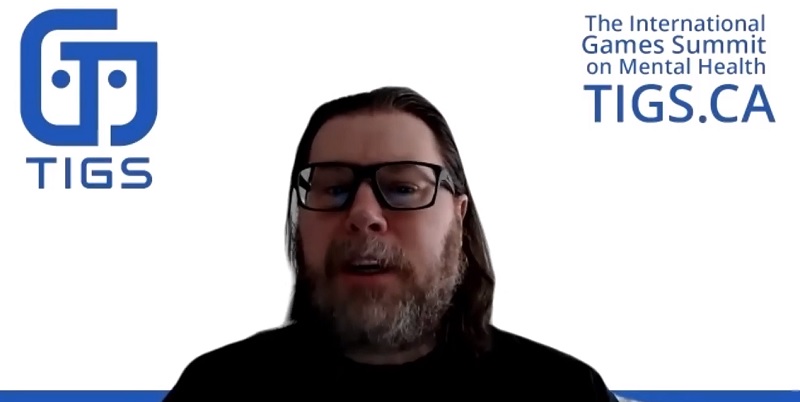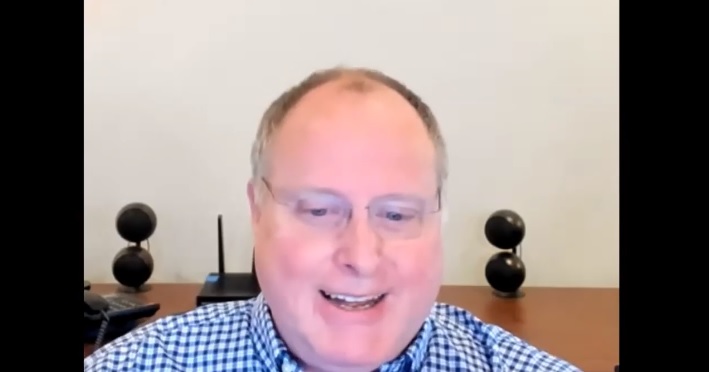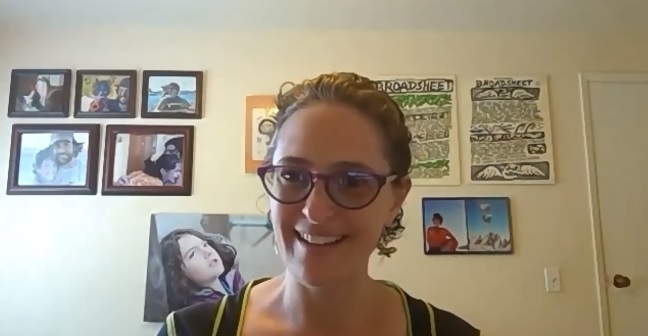Mental wellness for gaming professionals has come to the forefront as we all work in self-isolation at our homes, often cut off from normal social and family support groups.
Mark Chandler, the founder of The International Games Summit for Mental Health Awareness (TIGS), moderated a discussion for GamesBeat Summit 2020 with two folks well-versed in the subject: Eve Crevoshay, the executive director of Take This; and John Smedley, co-creator of Everquest and head of the Amazon Game Studios’ San Diego outpost. (Take This is one of the organizations we are raising money for).
Last night, we gave our third-annual Visionary Award to Smedley — both for his leadership on the 1990s massively multiplayer online role-playing game Everquest and his openness about facing depression — and we gave our first-ever Up and Comer Award to Crevoshay for her contributions and fresh ideas for this cause.
The session is a first for GamesBeat in addressing the issue of mental health in games. But it’s clear the issue has been a real hot topic for some time. Chandler said that Hellblade: Senua’s Sacrifice (my favorite game of 2017) was groundbreaking in raising the possibility that a mentally ill person could be the hero of a story.
June 5th: The AI Audit in NYC
Join us next week in NYC to engage with top executive leaders, delving into strategies for auditing AI models to ensure fairness, optimal performance, and ethical compliance across diverse organizations. Secure your attendance for this exclusive invite-only event.
“This chat is about how do we create a more welcoming environment for people suffering mental illness or mental distress in the workplace, and how do we even get this talk going,” Chandler said.
Chandler mentioned that three senior executives in the game industry unfriended him on Facebook when he tried to broach conversations about mental health policies at their companies.
Challenges for game developers

Above: Mark Chandler is founder of The International Games Summit on Mental Health Awareness.
Chandler highlighted Hellblade: Senua’s Sacrifice at the first TIGS event in October. There, Paul Fletcher, a professor of health neuroscience from Cambridge University, talked about being a consultant on the game and described its life-changing impact on the community.
Smedley has openly talked about having depression, and he encourages people to share their own struggles and seek out help.
But Crevoshay noted that Smedley still is an outlier in being able to talk about it openly, while many suffer in silence. She said that 50% of people in the general population will suffer a mental health challenge during their lives, ranging from one-time events like the stress of quarantine to long-term diagnosis that requires treatment or hospitalization.
“Mental health challenges are pretty common and they’re normal, and there are certain work environments and work situations that can create great levels of challenge,” Crevoshay said.
That includes uncertainty, stress, burnout, crunch, and other issues, she said. Gaming is a hit-driven business with a lot of highs and lows, a lot of churn and change, from shipping a game to having a game canceled, Crevoshay said.
“That level of uncertainty can be very challenging,” Crevoshay.
On top of that, games are played online, and criticism can come back in huge waves, given toxic cultures where players don’t hold back their complaints.
Dealing with depression and other illnesses
Smedley said the game industry is like any other creative industry, like where developers are making things that are creative and require a lot of focus and energy. Like any other creative industry, there are people with depression.

Above: John Smedley is open about having depression and talking about it.
“I myself have depression,” he said. “When you are dealing with the issue of mental illness and depression in an industry like ours, you have to look at things like crunch. You have to look at things like schedule. When you talk about the cyclical nature, there is a lot of churn in the industry. It can be a very stressful industry. The flip side of that is you can make things that touch a lot of people’s lives. In a lot of cases, you can make things that give meaning to other people’s lives. We saw that when we made Everquest.”
Consumers also give feedback in real time, and sometimes it isn’t positive, Smedley said. Chandler added, “It was different back then [with Everquest starting in 1999]. The culture wasn’t nearly as toxic as it is nowadays. Back then, people were willing to help each other.”
Crevoshay said she isn’t sure that the level of toxicity has changed or if it’s that the internet audience has gotten bigger. Games still offer an amazing support community and we are seeing that right now during the pandemic, Crevoshay said, “as there are really meaningful relationships to be had online, and there are really meaningful relationships through play.”
Smedley said toxicity was present early on, but there are a lot more people out there with a wider mix of personalities. The challenge for game developers is not to internalize the criticism you see every single day online.
“You have to develop a Zen about not responding too quickly to that,” Smedley said. “You have to realize these are passionate people playing games they love. How many times have you sat in a movie and yelled at the movie screen because the character does something so stupid. Or playing somebody else’s game and you’re frustrated with something. The culture has developed over time where people feel they can say anything they want to and that can be challenging, especially for people going into it — maybe they’re depressed — and they look for criticism. You read the one bad thing and focus on it. I see a lot of that. It is something you have to be talking to your teams, coaching them not to internalize. Meanwhile, I try to follow my own advice.”
Crevoshay added, “It’s all about good boundaries. Boundaries are hard to maintain. I talk a lot about my own boundaries as a parent. Being a parent means being really clear about your own boundaries. Working in an industry that plays out online means being clear about your own boundaries. Understanding what is relevant and what’s not to you. And what to internalize and what not to internalize. In terms of supporting mental health in the workplace, you need a lot of guidance and a lot of support from your colleagues and supervisors. Leadership really matters here.”
During COVID-19, the boundaries have blurred between work and home. Kids pop in during the middle of a work call. Crevoshay said she stops working at her desk at some point during off-hours. That helps keep a lid on work hours.
Chandler asked how to move that forward for companies to take these steps in removing the stigma of mental illness from work.

Above: Eve Crevoshay is executive director of Take This.
“The thing I advocate for this is very simple,” Smedley said. “You have to manage it. You have to take it seriously. I am very open about the fact that I have depression with my teams. I encourage people if they are comfortable with it to talk to someone. I am super about it online, and I find that an amazing number of people [are affected]. One-in-six people in the United States are on an antidepressant. That’s a very, very large number of people. If you have a team of 60 people, 10 of those people are going to be on antidepressants.”
Having somebody to talk to is 90% of the battle, Smedley said. Crevoshay said that reducing the stigma comes from high-level people like Smedley being open, but also increasing the mental health literacy of people so they understand and have language to talk about their own experiences with the people around them.
“If we have good representation of mental illness in games, then the very things we make help us to understand and describe out own experience,” Crevoshay said.
Working from home lessons
Chandler brought up that some understanding has to happen right now with the conditions of COVID-19. He said, “I can do great, outstanding work. I just can’t do it within the confines of 9-to-5 working hours.” Smedley noted that Amazon has liberal work-from-home policies, but the situation is forcing work flows and day-to-day management to get better.
Smedley has found that a 10:30 a.m. “stand up” meeting and a 4:30 p.m. “happy hour” works in the current environment. He said people need to talk a lot more, and it’s something they need. Many have kids, and so flexible time really works. As long as the staff shows up for the 10:30 a.m. event, he is happy with any hours they work, as long as they get their work done. The happy hour helps blow off steam.

Above: Senua’s journey in Hellblade deals in mental health.
“Everybody is learning the same things, like making sure to talk to people every day and have frequent 1-on-1 conversations,” Smedley said.
In this situation, Crevoshay said people need a “lot more modeling of good self care.” She asked Smedley if productivity is slowing down. He said that the project itself hasn’t slowed down, but the iteration — the idea of checking whether colleagues think a change in the game is good or not — has slowed down because it’s harder to get feedback without being physically together. There’s longer back and forth, he said.
“You have to be a lot more explicit, or be more thoughtful,” he said. “You can’t just smile. The words need to be said. You have to give quick feedback. I haven’t seen productivity go down. I have seen the amount that we iterate go down.”
Leadership
As a manager, your words carry more weight, Smedley said. He said he invites anyone to come to him to talk.
He said everyone is learning a lot more about the personal lives about colleagues, and he said, “It borrows zero people when a kid comes into the room and wants to talk to mom or dad. No big deal. In a weird way, I think it’s going to bring us closer.”
Chandler said that companies should think about having a “chief wellness officer” as someone to talk to. Crevoshay liked that idea but she also said the responsibility lies with leadership and managers for setting the tone and “walking the walk” and saying supportive things.
Chandler, Crevoshay, and Smedley are used to talking about these things. But for GamesBeat Summit, this was a first.

